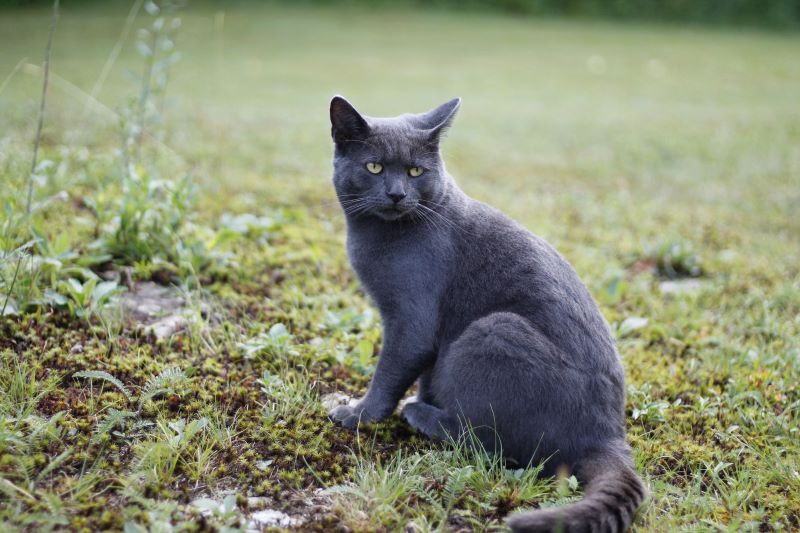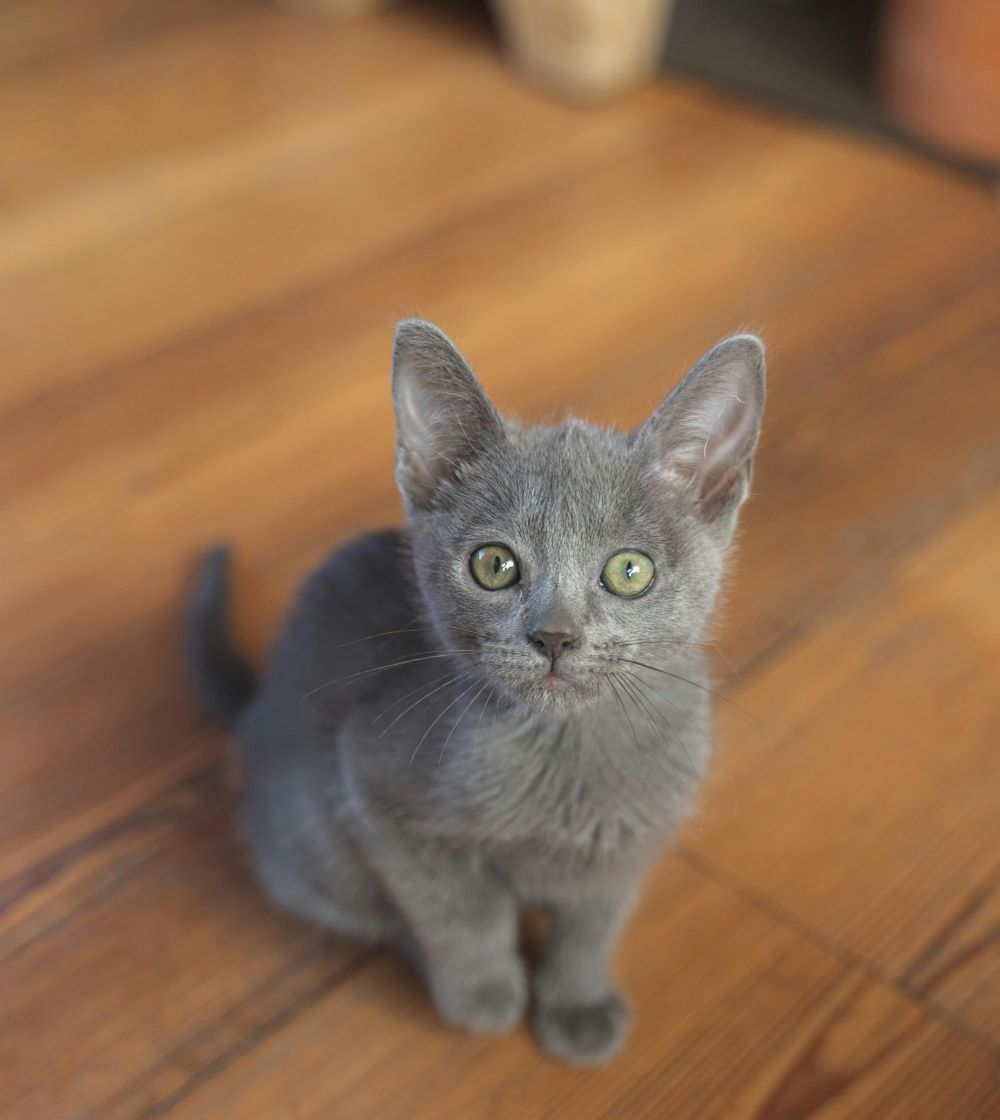Get Pet Insurance for your Cat & Dog

Zero
Documentation
Quick
Claim Process
Affordable
Premium
Terms and conditions apply*
- {{species}}
- {{indoorOutdoor}}
- {{suminsured}}
Korat Cat Breed Characteristics & Information

Korat cats make wonderful pets for individuals and families alike. They are known for their loyalty, intelligence, and devotion to their owners. Their loving and adaptable nature makes Korats suitable for first-time cat owners seeking a loyal and affectionate companion.
In this comprehensive guide, we delve into the realm of Korat cats, exploring their characteristics, care needs, and more.
What is the History of Korat Cats?
Originating from Thailand's ancient city of Korat, these cats are considered a national treasure. Despite their cultural significance, they're relatively rare outside their homeland. They are often given as gifts on special occasions, such as weddings, to bring prosperity and blessings to the recipient.
Identifying a Korat is relatively easy due to its distinct silver-blue coat. Their eyes, which are large and almond-shaped, are a vivid green colour and further enhance their captivating appearance. Korat cats are also known as Si-sawat, which means "colour of the Sawat seed" in Thai, referring to their unique blue-grey coat colour.
What are the Characteristics of Korat Cats?

It is important to understand the characteristics of Korat cats to provide them with the best care and companionship. Their distinctive characteristics include:-
- Lifespan: On average, Korat cats have a lifespan of 12-15 years. However, with proper care and a healthy lifestyle, they can live well into their late teens.
- Height: Korat cats are of medium height, standing 8 to 10 inches tall. They have a solid bone structure that contributes to their overall elegance and grace.
- Colour: The distinguishing feature of the Korat cat is its silver-blue coat. This colour is uniform throughout their body, giving them a captivating and ethereal appearance.
- Weight: Korat cats are relatively small to medium-sized cats, weighing between 2.7 to 4.5 kg. Females tend to be smaller and lighter than males.
- Behaviour and Personality: They are highly affectionate and loyal. They usually get along well with other cats and kids.
- Living Condition: They are suited for indoor living. They are not fond of extreme weather conditions and prefer a comfortable and secure environment indoors.
- Temperament: Korat cats are highly intelligent, active and curious creatures. They have a keen sense of observation and are known for their problem-solving abilities.
- Coat and Breed: They have a short, dense, and lustrous coat. They belong to the shorthair breed group and maintain their distinctive coat colour throughout their lives.
How to Train Korat Cats?
Korat cats are intelligent and receptive to training, each cat has its unique personality, and some may be easier than others. Here is how you can train them:
- Start Early: Begin training your Korat cat from an early age. This will help them become accustomed to various situations and establish good behaviour patterns.
- Brain Games: Stimulate your cat's mind with interactive puzzle toys or treat-dispensing games. This will keep their minds engaged and prevent boredom.
- Discipline Training: Use gentle discipline techniques, such as redirecting their attention or using a firm "no" to discourage any unwanted behaviour.
- Socialisation: Introduce your Korat cat to different people, animals, and environments to ensure they develop a well-rounded and confident personality.
- Fetching: Unlike most cats, Korat cats are known to enjoy playing fetch. Use this natural inclination to your advantage and incorporate fetch games into their training routine.
- Potty Training: Train your Korat cat how to use the litter box as early as you can. Ensure the box is clean, and praise them whenever they use it properly.
What are the Health Problems with Korat Cats?
Although Korat cats are generally healthy, like any breed, they may be prone to certain health issues. Here are five common health issues:
- Gangliosidosis GM1 and GM2: Korat cats are genetically predisposed to a rare inherited disease called Gangliosidosis. Genetic screening can help identify carriers and prevent the transmission of this disease.
- Kidney Disease: Korat cats may be susceptible to kidney disease, which could be caused by various factors, including genetic predisposition, infections, or diet. Regular check-ups and a balanced diet can help maintain optimal kidney health.
- Hyperthyroidism: Like many other cat breeds, Korat cats may develop an overactive thyroid gland, resulting in hyperthyroidism. This hormonal imbalance can lead to weight loss, increased appetite, and other related symptoms.
- Stomach Infection: Korat cats may be prone to gastrointestinal issues, such as stomach infections. Feeding them a high-quality diet, providing clean water, and maintaining good hygiene practices can help minimise the risk of infection.
- Dental Disease: Dental health is crucial for all cats, including Korats. They can be prone to dental disease, such as tooth decay and gum inflammation. Regular dental care, including brushing their teeth, can help prevent dental issues.
How to Take Care of Korat Cats?
While they are not overly high maintenance, certain care requirements are essential for their overall health. Here are tips to take care of Korat cats:
- Diet and Nutrition: Feed your Korat cat a well-balanced diet consisting of cooked beef, turkey, chicken, de-boned fish, oats, egg whites and boneless chicken.
- Feeding: Feed them about 1/4 to 1/2 cup of dry cat food per meal, and meals are typically given twice a day. Avoid overfeeding, as they are prone to weight gain.
- Grooming: Korat cats' short fur needs little grooming; brush them once a week to keep it glossy and remove loose hair easily.
- Exercise: Korat cats are very energetic, and it's important for them to provide daily exercise sessions. Play with them and offer toys for their health and happiness.
- Bathing: Korat cats rarely require baths. However, if necessary, use a gentle cat shampoo and ensure they are properly dried afterwards to prevent any discomfort.
- Clean Litter Box: Korat cats are tidy and naturally use litter boxes. Keep a clean litter box, easily reachable, and scoop it daily for proper hygiene.
Korat cats, with their captivating blue-grey coat and endearing personality, make wonderful companions. By understanding their characteristics, providing proper training, regular veterinary care, and meeting their specific care needs, you can ensure a happy and healthy life for your Korat cat.












